56.1.5.6 (56 > 49)
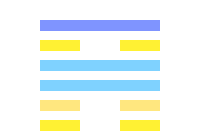
56.1.5.6 (56 > 49) - THE LÜ HEXAGRAM.
- 1. The first line, divided, shows the stranger mean and meanly occupied. It is thus that he brings on himself (further) calamity.
- 5. The fifth line, divided, shows its subject shooting a pheasant. He will lose his arrow, but in the end he will obtain praise and a (high) charge.
- 6. The sixth line, undivided, suggests the idea of a bird burning its nest. The stranger, (thus represented), first laughs and then cries out. He has lost his ox(-like docility) too readily and easily. There will be evil.
56.1.5.6 (56 > 49) - Searching
One can see that it is time to withdraw from the race.
Bing DeepL Google Yandex56.1.5.6 (56 > 49) - Searching
One can see that it is time to withdraw from the race.
Bing DeepL Google Yandex56.1.5.6 (56 > 49) - Lu, le voyageur
Lu : voyageur, hôte, étranger, loger ; bon arrangement.
- 1. Les étrangers ambulants, petits et faibles, sont exposés à bien des maux. [Quand le but est bas, les calamités s’ensuivent.]
- 5. Il tire un faisan et sa flèche s’échappe une fois (manque le but) ; à la fin, par les louanges qu’il sait mériter, il reçoit accueil et fonction du prince.
- 6. L’oiseau détruit son nid ; l’étranger ambulant rit d’abord, puis pousse de hauts cris, parce qu’il perd son bœuf ; ainsi, trop aisément, un changement amène un mal.
56.1.5.6 (56 > 49) - Chercher
On voit qu'il est temps de se retirer de la course.
Bing DeepL Google Yandex56.1.5.6 (56 > 49) - Keresés
- 1. Ha valaki nagy veszteségeket szenvedett, nem engedheti el magát.
- 5. Felkészül az alternatívákra ha szükséges.
- 6. Meggondolatlanság elfogadni megbeszélés nélkül.
Les trigrammes
Les trigrammes sont des combinaisons de trois traits yin et yang. Dans l'hexagramme, les trois traits du dessous constituent le trigramme inférieur et représentent la situation intérieure. Les trois lignes du haut constituent le trigramme supérieur et représentent la situation extérieure.
Trigramme supérieur : Le feu Le lac


Trigramme inférieur : La montagne Le feu


La formation: 56
What is already there

56 - THE LÜ HEXAGRAM.
Lü intimates that (in the condition which it denotes) there may be some little attainment and progress. If the stranger or traveller be firm and correct as he ought to be, there will be good fortune.
Bing DeepL Google Yandex56 - Lu, le voyageur
Lu : voyageur, hôte, étranger, loger ; bon arrangement.
Lu « bon arrangement ». Avec un faible commencement, le bon arrangement conduit au succès, à la consolidation, au bonheur.
Texte
L’étranger ambulant prospère difficilement. S’il est juste et droit, il aura une heureuse fortune.
Symbolisme
Le feu au-dessus d’une montagne. Ainsi le grand et sage fait briller sa droiture en appliquant les lois pénales et ne laisse pas durer les différends et les procès.
Commentaire
Si le faible acquiert, maintient sa droiture chez les étrangers et reste soumis au fort, il sera stable et attaché à la claire vérité. Ainsi l’étranger nomade, faible au commencement, prospérera et s’affermira s’il est droit et juste.
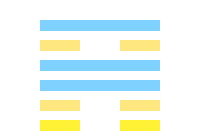
56.1 (56 > 30) - THE LÜ HEXAGRAM.
The first line, divided, shows the stranger mean and meanly occupied. It is thus that he brings on himself (further) calamity.
Bing DeepL Google Yandex56.1 (56 > 30) - Coping
When one has suffered great losses, one must not let oneself go.
Bing DeepL Google Yandex56.1 (56 > 30) - Coping
When one has suffered great losses, one must not let oneself go.
Bing DeepL Google Yandex56.1 (56 > 30) - Lu, le voyageur
Lu : voyageur, hôte, étranger, loger ; bon arrangement.
Les étrangers ambulants, petits et faibles, sont exposés à bien des maux. [Quand le but est bas, les calamités s’ensuivent.]
Bing DeepL Google Yandex56.1 (56 > 30) - Tenir le coup
Quand on a beaucoup perdu, on ne doit pas se laisser aller.
Bing DeepL Google Yandex56.1 (56 > 30) - Keresés
Ha valaki nagy veszteségeket szenvedett, nem engedheti el magát.
Bing DeepL Google Yandex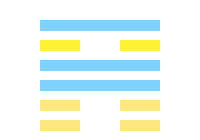
56.5 (56 > 33) - THE LÜ HEXAGRAM.
The fifth line, divided, shows its subject shooting a pheasant. He will lose his arrow, but in the end he will obtain praise and a (high) charge.
Bing DeepL Google Yandex56.5 (56 > 33) - Working cleanly
One prepares alternative solutions if necessary.
Bing DeepL Google Yandex56.5 (56 > 33) - Working cleanly
One prepares alternative solutions if necessary.
Bing DeepL Google Yandex56.5 (56 > 33) - Lu, le voyageur
Lu : voyageur, hôte, étranger, loger ; bon arrangement.
Il tire un faisan et sa flèche s’échappe une fois (manque le but) ; à la fin, par les louanges qu’il sait mériter, il reçoit accueil et fonction du prince.
Bing DeepL Google Yandex56.5 (56 > 33) - Travailler proprement
On prépare des solutions alternatives si nécessaire.
Bing DeepL Google Yandex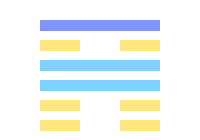
56.6 (56 > 62) - THE LÜ HEXAGRAM.
The sixth line, undivided, suggests the idea of a bird burning its nest. The stranger, (thus represented), first laughs and then cries out. He has lost his ox(-like docility) too readily and easily. There will be evil.
Bing DeepL Google Yandex56.6 (56 > 62) - Being light-headed
It is imprudent to accept without discussion.
Bing DeepL Google Yandex56.6 (56 > 62) - Being light-headed
It is imprudent to accept without discussion.
Bing DeepL Google Yandex56.6 (56 > 62) - Lu, le voyageur
Lu : voyageur, hôte, étranger, loger ; bon arrangement.
L’oiseau détruit son nid ; l’étranger ambulant rit d’abord, puis pousse de hauts cris, parce qu’il perd son bœuf ; ainsi, trop aisément, un changement amène un mal.
Bing DeepL Google YandexEn préparation : 49
Ce qui est en passe d'arriver

49 - THE KO HEXAGRAM.
(What takes place as indicated by) Ko is believed in only after it has been accomplished. There will be great progress and success. Advantage will come from being firm and correct. (In that case) occasion for repentance will disappear.
Bing DeepL Google Yandex49 - Tidying up
Renewal is necessary when shortcomings are identified and a replacement plan is in place. One will then have an interest in making the changes. Forget about regrets.
Bing DeepL Google Yandex49 - Tidying up
Renewal is necessary when shortcomings are identified and a replacement plan is in place. One will then have an interest in making the changes. Forget about regrets.
Bing DeepL Google Yandex49 - Koh, la révolution, la mue
Koh : 1. Peau, cuir, tanner, écorcher ; 2. Changer, différer.
Ko « changement, amélioration ». Quand, après avoir parlé, on se montre digne de confiance, tout suit un heureux cours, et le repentir disparaît (n’a plus de raison d’être).
Texte
Quand (on change) et qu’on devient sincèrement droit, on sera après cela constamment sans regret.
Symbolisme
L’eau sous le feu figure le changement. L’homme supérieur règle ses calculs (le calendrier) d’après les changements du ciel et annonce les temps et les saisons. — Dans les marais même il y a du feu.
Commentaire
L’eau et le feu, arrêtant mutuellement leur action, figurent koh. Il en est de même de deux soeurs habitant ensemble et de volontés différentes, opposées.
Après un certain temps, se montrer sincère, c’est changer, se corriger ; on inspire alors confiance. Par le talent et l’intelligence, on acquiert la satisfaction ; par de grands progrès en vertu, on acquiert la rectitude. Quand on change de cette manière, tous les sujets de regret disparaissent.
Le ciel et la terre changeant, les quatre saisons s’accomplissent. Tang et Wuh-Wang changèrent le décret céleste. Ainsi, ils obéirent au ciel et répondirent au désir des hommes. Grand, en effet, et bien important est le moment des changements.
Note. Tang est le chef de la dynastie Shang, qui enleva le trône au dernier des Hia (Ire dynastie), devenu tyran. Wuh-Wang renversa de même le dernier des Shang et lui enleva le décret céleste qui l’avait fait roi.
Note. Le § 1 prend le mot koh dans le sens de cuir ; les autres dans l’acception de changement, changement de conduite, correction ; changement d’ordres, de dispositions chez le sage et le grand ; changement des saisons, le plus important de tous, dit un commentaire
49 - Ranger
Le renouvellement est nécessaire quand on constate des insuffisances et que l'on a un plan de remplacement. On aura alors intérêt à mener les changements à bien. Oublier les regrets.
Bing DeepL Google Yandex49 - Vándor
Megújulásra van szükség ha hiányosságok tapasztalhatók és tartalék tervre. Az lesz az érdekük, hogy befejezzék a változást. El kell felejteni a megbánást.
Bing DeepL Google YandexL'hexagramme nucléaire : 28.6 (28 > 44)
L'hexagramme nucléaire est l'association des deux trigrammes intérieurs (traits 2,3,4 et 3,4,5). Il représente la racine, ou l'origine de la situation.

28.6 (28 > 44) - THE TÂ KWO HEXAGRAM.
The topmost line, divided, shows its subject with extraordinary (boldness) wading through a stream, till the water hides the crown of his head. There will be evil, but no ground for blame.
Bing DeepL Google Yandex28.6 (28 > 44) - Losing one's bearings
One wants to continue alone because of the weakness of one's entourage.
Bing DeepL Google Yandex28.6 (28 > 44) - Losing one's bearings
One wants to continue alone because of the weakness of one's entourage.
Bing DeepL Google Yandex28.6 (28 > 44) - Tá kvoh, le grand excès
Tá kvoh : 1. Grand excès, défaut, manquement ; 2. Traverser, dépasser.
Traversant un fleuve, y entrer jusqu’au sommet de la tête est chose dangereuse, (mais peut n’être point blâmable, si on le fait pour aider quelqu’un, d’après le Com.) (3e sens). Force défaillante.
Bing DeepL Google Yandex28.6 (28 > 44) - Perdre ses repères
On veut continuer seul à cause de la faiblesse de son entourage.
Bing DeepL Google Yandex28.6 (28 > 44) - Lemondás
Egyedül akar haladni a környezők gyengesége miatt.
Bing DeepL Google YandexGuide
La situation de départ

56.6 (56 > 62) - THE LÜ HEXAGRAM.
The sixth line, undivided, suggests the idea of a bird burning its nest. The stranger, (thus represented), first laughs and then cries out. He has lost his ox(-like docility) too readily and easily. There will be evil.
Bing DeepL Google Yandex56.6 (56 > 62) - Being light-headed
It is imprudent to accept without discussion.
Bing DeepL Google Yandex56.6 (56 > 62) - Being light-headed
It is imprudent to accept without discussion.
Bing DeepL Google Yandex56.6 (56 > 62) - Lu, le voyageur
Lu : voyageur, hôte, étranger, loger ; bon arrangement.
L’oiseau détruit son nid ; l’étranger ambulant rit d’abord, puis pousse de hauts cris, parce qu’il perd son bœuf ; ainsi, trop aisément, un changement amène un mal.
Bing DeepL Google YandexCorrection
La direction suivant laquelle le guide va plier
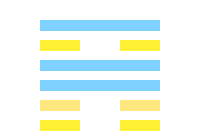
56.1.5 (56 > 13) - THE LÜ HEXAGRAM.
- 1. The first line, divided, shows the stranger mean and meanly occupied. It is thus that he brings on himself (further) calamity.
- 5. The fifth line, divided, shows its subject shooting a pheasant. He will lose his arrow, but in the end he will obtain praise and a (high) charge.
56.1.5 (56 > 13) - Searching
One prefers not to tell others what one has changed.
Bing DeepL Google Yandex56.1.5 (56 > 13) - Searching
One prefers not to tell others what one has changed.
Bing DeepL Google Yandex56.1.5 (56 > 13) - Lu, le voyageur
Lu : voyageur, hôte, étranger, loger ; bon arrangement.
- 1. Les étrangers ambulants, petits et faibles, sont exposés à bien des maux. [Quand le but est bas, les calamités s’ensuivent.]
- 5. Il tire un faisan et sa flèche s’échappe une fois (manque le but) ; à la fin, par les louanges qu’il sait mériter, il reçoit accueil et fonction du prince.
56.1.5 (56 > 13) - Chercher
On préfère ne pas dire aux autres ce que l'on a changé.
Bing DeepL Google Yandex56.1.5 (56 > 13) - Keresés
- 1. Ha valaki nagy veszteségeket szenvedett, nem engedheti el magát.
- 5. Felkészül az alternatívákra ha szükséges.
Forum
Avez-vous besoin d'aide pour comprendre ce tirage ?
Rejoignez le forum et demandez de l'aide.
BBCode
Le BBCode ci-dessous est à votre disposition pour être copié-collé dans votre fil de discussion.
Link
Lien vers ce tirage

